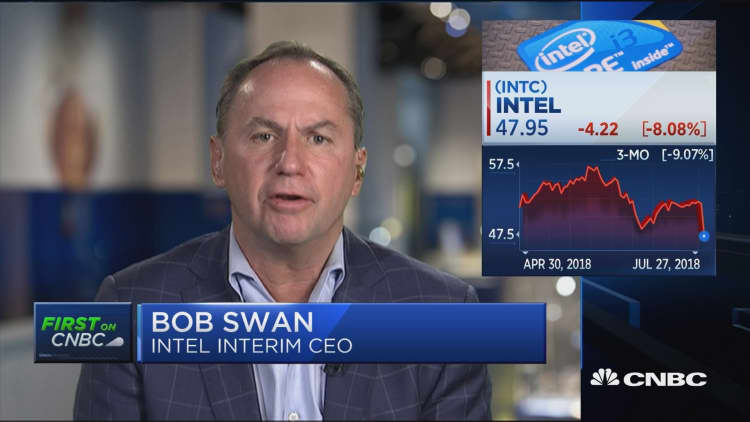Shares of Intel closed down 8.6 percent on Friday on fears of stiffening competition and product delays.
The chipmaker opened the day at $48.76 per share, before falling to an intraday low of $47.48 per share. By market close, Intel had recovered slightly, finishing out the day at $47.68 per share.
Despite the chipmaker reporting strong second-quarter earnings and revenue on Thursday, several analysts expressed concerns about competition from the likes of Advanced Micro Devices. Delays on next-generation microchips, which have plagued the company for months, certainly aren't helping.
AMD soared 14 percent on Thursday after reporting quarterly earnings and revenue that impressed Wall Street.
"The setup is for Advanced Micro Devices to control both the architectural and process node aspects of the x86 [processor] market for years to come; a dynamic we have never seen before and structurally destructive for Intel's business model. We reiterate our Sell rating," Rosenblatt Securities wrote in a note on Friday. The analysts noted that Intel could lose its "near monopolistic position in CPUs that allowed for increased ASPs."
Intel has been struggling to maintain production timeline goals on its next-generation chips. In its earnings release, Intel revealed the company's 10-nanometer chip production process would arrive in the second half of next year, meaning its next-generation products would arrive by the holiday season of 2019. Intel has teased the large-scale release of 10-nanometer chips for years, promising they'd deliver better performance with lower power usage than chips built with the company's 14-nanometer technology, which have been shipping since 2014.
The chip delays prompted Bank of America Merrill Lynch to downgrade shares of Intel on Friday to "neutral" from "buy," calling the delays Intel's "biggest risk."
Even as Intel struggles with 10-nanometer chip production, AMD said earlier in July it plans to start next-generation 7-nanometer chip production in late 2018.
"The biggest risk to Intel is the year delay in shipments of its next-gen 10 [nanometer] product while rivals Taiwan Semiconductor have finally caught up and are enabling Advanced Micro Devices, Nvidia and Xilinx to potentially leapfrog," Bank of America analysts wrote.
Analysts at Stifel echoed Bank of America's concerns about 10-nanometer chips, adding that the costs to ramp up production could reduce the gross margin.
"We are not convinced that 2019 [gross margin] will expand year over year," Stifel wrote in a note on Friday.



